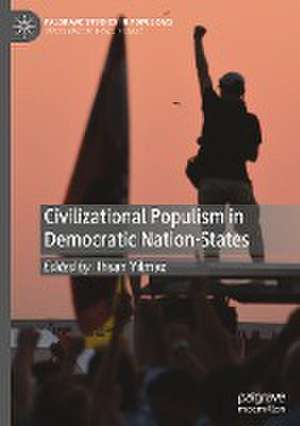Civilizational Populism in Democratic Nation-States: Palgrave Studies in Populisms
Editat de Ihsan Yilmazen Limba Engleză Hardback – 9 sep 2023
With this, the book investigates the salience of the concept, its widespread and influential nature, and also explains how populists construct civilizational identities, and the factors behind the rise of civilizational populism.
Preț: 731.73 lei
Preț vechi: 892.35 lei
-18% Nou
Puncte Express: 1098
Preț estimativ în valută:
140.01€ • 146.20$ • 115.62£
140.01€ • 146.20$ • 115.62£
Carte tipărită la comandă
Livrare economică 15-29 aprilie
Preluare comenzi: 021 569.72.76
Specificații
ISBN-13: 9789819942619
ISBN-10: 9819942616
Ilustrații: XIII, 329 p. 1 illus.
Dimensiuni: 148 x 210 mm
Greutate: 0.56 kg
Ediția:1st ed. 2023
Editura: Springer Nature Singapore
Colecția Palgrave Macmillan
Seria Palgrave Studies in Populisms
Locul publicării:Singapore, Singapore
ISBN-10: 9819942616
Ilustrații: XIII, 329 p. 1 illus.
Dimensiuni: 148 x 210 mm
Greutate: 0.56 kg
Ediția:1st ed. 2023
Editura: Springer Nature Singapore
Colecția Palgrave Macmillan
Seria Palgrave Studies in Populisms
Locul publicării:Singapore, Singapore
Cuprins
Chapter 1: Civilizational Populism in Nation-States and Democracy.- Chapter 2: Civilizational Populism: Definition, Literature, Theory, and Practice.- Chapter 3: USA, France and Poland: Christian Civilizational Populism.- Chapter 4: Turkey: Islamist Civilizational Populism.- Chapter 5: Pakistan: Islamist Civilizational Populism.- Chapter 6: Malaysia: Islamist Civilizational Populism.- Chapter 7: Indonesia: Islamist Civilizational Populism.- Chapter 8: India: Hindu Civilizational Populism.- Chapter 9: Sri Lanka: Buddhist Civilizational Populism.- Chapter 10: Israel: Jewish Civilizational Populism.- Chapter 11: Civilizational Populism and Democracy.
Notă biografică
Ihsan Yilmaz is Research Professor and Chair of Islamic Studies at the Alfred Deakin Institute for Citizenship and Globalisation (ADI), Deakin University, Melbourne, Australia. He has been working on religion and politics in majority and minority contexts, nation-building, citizenship, securitization, populism, authoritarianism, and digital authoritarianism.
Textul de pe ultima copertă
This edited book examines the growing worldwide phenomenon of civilizational populism in democratic nation-states and brings together research that explores this in a wide variety of religious, political, and geographic contexts. In doing so, the book shows how, from Europe to India and Pakistan, and from Indonesia to the Americas, populists increasingly define national belonging through civilizational identity, claiming that the world can be divided into several religion-defined civilizations with incompatible values. The volume also discusses the complex relationship between civilizational populism, democracy and nationalism and shows how nationalists often use civilizational identity to help define ingroups and outgroups within their society.
With this, the book investigates the salience of the concept, its widespread and influential nature, and also explains how populists construct civilizational identities, and the factors behind the rise of civilizational populism.
Ihsan Yilmaz is Research Professor and Chair of Islamic Studies at the Alfred Deakin Institute for Citizenship and Globalisation (ADI), Deakin University, Melbourne, Australia. He has been working on religion and politics in majority and minority contexts, nation-building, citizenship, securitization, populism, authoritarianism, and digital authoritarianism.
Ihsan Yilmaz is Research Professor and Chair of Islamic Studies at the Alfred Deakin Institute for Citizenship and Globalisation (ADI), Deakin University, Melbourne, Australia. He has been working on religion and politics in majority and minority contexts, nation-building, citizenship, securitization, populism, authoritarianism, and digital authoritarianism.
Caracteristici
Explores civilizational populism in democratic nation-states and how widespread and influential it has become Discusses the complex relationship between civilizational populism, democracy and nationalism Elaborates on how populists construct civilizational identities




